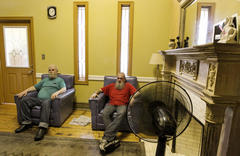 A thermometer shows the temperature is pushing 30C in a Dunn Ave. rooming house, but the two men watching TV sit in chairs quietly on a sweltering Wednesday midday, watching James Bond chase hot women and vanquish villains.
A thermometer shows the temperature is pushing 30C in a Dunn Ave. rooming house, but the two men watching TV sit in chairs quietly on a sweltering Wednesday midday, watching James Bond chase hot women and vanquish villains.A standing fan blows a little air towards John Capicciotti, 54, who’s lived in the Parkdale rooming house, south of Queen St. W., for about a year and is content. He shares his room with one person, and sometimes they leave the door open because the hallway is air-conditioned.
“It’s hot, but it’s not too bad,’’ says Capicciotti, who’s pretty stoical about the extreme heat alert issued by Dr. David McKeown, Toronto’s medical officer of health and in effect until further notice.
His TV-viewing buddy, Tim Sullivan, 59, has lived in the rooming house for five years and has no problem with the fact that his room is not air-conditioned.
“I just deal with it,’’ he says. “I drink a lot of water,’’ he says, and he admits he sweats a lot at night. But Sullivan is content and says he doesn’t wish for air conditioning. “I don’t need it.’’
Glenn Francis, 50, who also lives in the rooming house, says that he just goes outside and sits in the shade if he starts feeling too hot.
Licensed rooming houses in the City of Toronto are not required to provide a cool space, but licensed boarding homes are, says Victor Willis, executive director at PARC (Parkdale Activity Recreation Centre.)
None of the men the Star spoke to at the rooming house said they seek out air-conditioned public spaces in community centres, shopping malls, libraries and former civic centres that the City of Toronto advertises as places to go for people during extreme heat conditions.
But that’s exactly where fellow Parkdale resident Roy Fanning, 48, heads when the temperature and humidity becomes unbearable. He lives in a subsidized bachelor unit with no air conditioning and is grateful for places like Masaryk-Cowan Recreation Centre, near Lansdowne and Queen St. W., where he can cool down. And with the forecast for Thursday and Friday calling for highs in the low 30s (as well as a thunderstorms), he figures he’ll keep seeking them out.
“I come here or I go to the library or another community centre,’’ he says. “It can get unbearable’’ in his apartment, he adds.
People who are homeless or marginally housed, or who are on certain medications, are also at risk for more complications from extreme heat, according to an alert issued on the city’s website.
But while public cooling centres are available, people with mental health issues may have trouble finding them or using them, says Lana Frado, executive director of Sound Times, a downtown support agency that helps people with mental health problems and addictions.
“If you’re a rant-y, rave-y homeless guy, they’re not going to let you hang out in the Eaton Centre,’’ says Frado.
Some medications people take for depression, psychosis or other mental illnesses can make them more susceptible to heat, bright light and dehydration, says Frado.
Kevin Healey, who has heard voices in his head for decades and works as the facilitator of the Toronto Hearing Voices group, has some first-hand knowledge of the effects of heat and medications.
When he was taking the mood-stabilizer drugs olanzapine and lamitrogine and got hot, he broke out in “blistering hives’’ and experienced heatstroke, he said. He doesn’t take any medication now and says he works “hard at staying calm.”
“I keep reminding myself to go very slow, drink about twice as much water as normal and keep topping up my electrolytes.” Reported by Toronto Star 6 days ago.